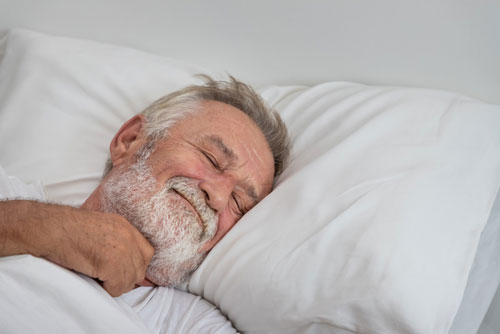If you slept poorly last night, you’re not alone.
About a third of Americans say they often have difficulty sleeping. This makes insomnia one of the nation’s most prevalent health problems.[1]
Insomnia is not a matter of just feeling tired the next day. It increases your risk for a wide range of serious conditions, including stroke, weakened immunity, inflammation, obesity, diabetes, high blood pressure, heart disease, and depression.[2]
Mainstream medicine’s first-line insomnia treatments are so-called Z drugs. They include zolpidem (Ambien), zalepon (Sonata), and eszopiclone (Lunesta).
They work by slowing brain activity. The problem is that they aren’t effective over the long term. You eventually develop a tolerance for them. And their side effects are enough to give you nightmares.
Even more concerning, a study in the British Medical Journal found that people who take the largest prescribed doses of Z pills are more than five times more likely to die—of any cause—than those not taking sleeping pills.
The most common include dizziness, cognitive dysfunction, headaches, weakness, physical impairment the following day, and even uncontrollable shaking. They can also cause sleepwalking, hallucinations, violent outbursts, sleep driving, and even suicidal thoughts.[3] [4]
Dr. Daniel Kripke led the study. He estimates that these pills could be associated with up to half a million deaths per year.[5] [6]
New research shows that a natural supplement derived from flowers can put you to sleep without dangerous side effects.
The study comes from Australia’s Murdoch University. Researchers gave insomnia sufferers a daily saffron extract for 28 days. Most subjects slept better within a week.
Dr. Adrian Lopresti was the lead researcher. He said that, besides improved sleep, the study “showed that saffron was well tolerated with no reported adverse effects.”[7]
Saffron is derived from the crocus flower. It originated in Greece, where it has been used medicinally for centuries.
In addition to being effective against insomnia, studies have found that it fights inflammation, depression, cancer, PMS symptoms, and weight gain.[8]
6 Natural Ways to Better Sleep
Saffron supplements are available at health food stores and from online retailers. And there are other lifestyle and diet changes that can help give you a perfect night’s sleep:
- Melatonin. This hormone is produced by your pineal gland. It regulates and encourages your natural sleep cycle. A great natural source of melatonin is tart cherries.
If you take a melatonin supplement, be careful not to take too much, which can actually harm sleep. Start with half the dosage recommended on the label. Melatonin works best for insomnia caused by jet lag or time change.[9] - L-tryptophan. This amino acid helps your body produce serotonin, which increases relaxation. Great sources of L-tryptophan include organic poultry, fish, eggs, and beef.
- A cold room. Research has found that the best temperature for sound sleeping is between 60 and 67 degrees.[10]
- Daily exercise. Even light exercise during the day helps you sleep at night. But don’t exercise within three hours of bedtime.
- No blue light after dark. A Harvard Medical School study found that using blue light-emitting devices like computers, tablets, and smartphones just before bedtime can wreck your sleep. Blue light suppresses melatonin production. If you are a bedtime reader, stick to an old-fashioned printed book.[11]
- A new mattress. If you’ve been sleeping on the same mattress for a decade or more, consider buying a new one. Sleep researchers have found that mattresses older than 10 years lose their comfort and hinder sound sleep.
Insomnia drugs can be tempting. But the dangers are as bad—if not worse—than sleep deprivation. Saffron and other natural remedies are better, safer long-term solutions for a good night’s sleep.
Editor’s Note: If you suffer from insomnia, you’ll want to know about a simple breathing trick that can end your sleepless nights. Learn about it in Independent Healing, the monthly journal that brings you science-backed health advice you won’t find anywhere else. Go HERE to subscribe.
Related Articles
Don’t Let Insomnia Wreck Your Heart
New Scientific Evidence Proves Cannabis Relieves Pain and Insomnia
This One Healthy Habit Can
Cure Insomnia in Just a Week
Like this Article? Forward this article here or Share on Facebook.
[1]https://www.medscape.com/answers/1187829-70532/what-is-the-prevalence-of-insomnia
[2]https://www.healthline.com/health/insomnia-concerns#effects-and-impact
[3]http://www.helpguide.org/articles/sleep/sleeping-pills-and-natural-sleep-aids.htm
[4]http://www.webmd.com/sleep-disorders/guide/understanding-the-side-effects-of-sleeping-pills#1
[5]https://www.ncbi.nlm.nih.gov/pubmed/22371848
[6] https://www.theguardian.com/science/2012/feb/27/sleeping-pills-increase-risk-death-study
[7]https://medicalxpress.com/news/2020-02-dose-saffron-doze.html
[8] https://www.healthline.com/nutrition/saffron#section6
[9]https://www.institutefornaturalhealing.com/2013/09/the-top-5-natural-sleep-aids
[10]https://sleepfoundation.org/sleep-tools-tips/healthy-sleep-tips
[11]https://www.institutefornaturalhealing.com/2016/05/harvard-study-never-do-this-in-bed

